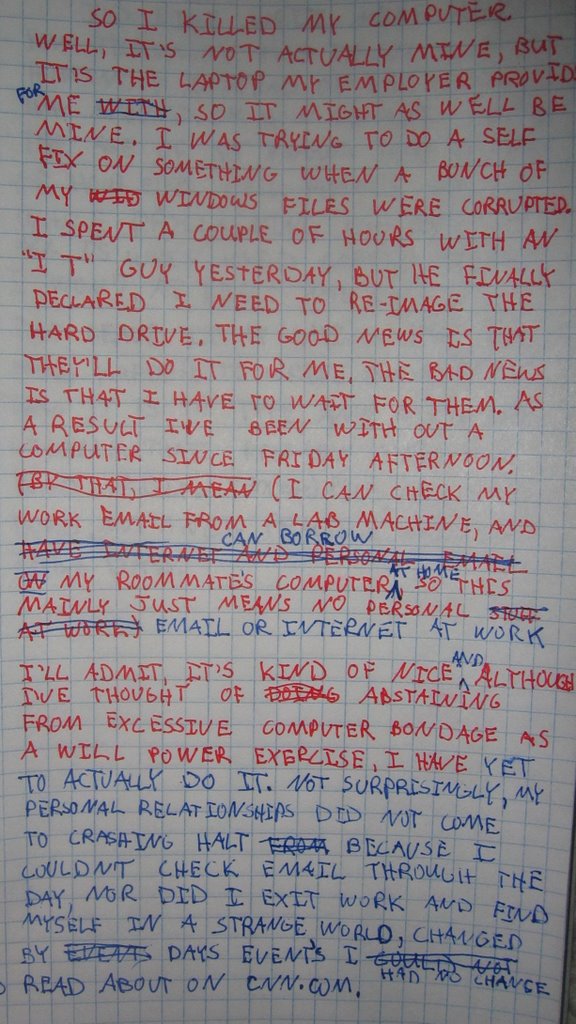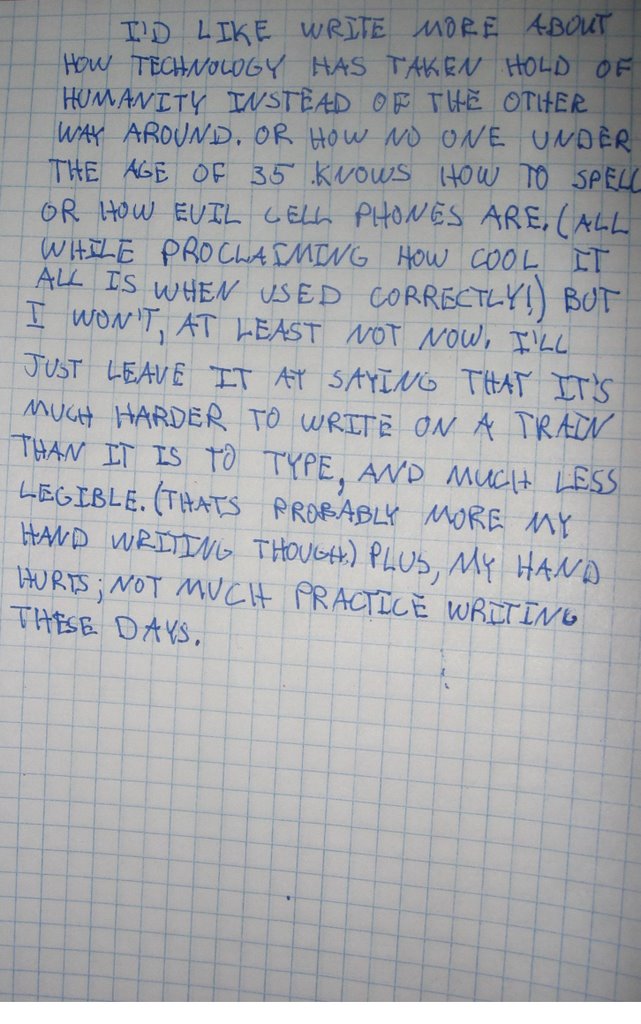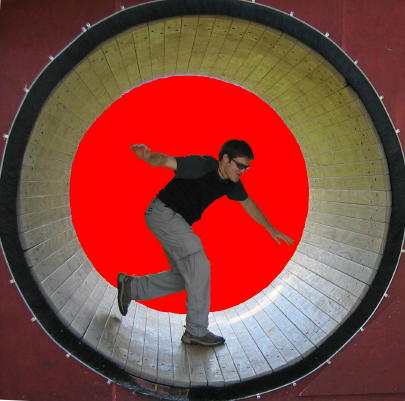A week or so back a topic came up regarding the pros and cons of technology. Being the perpetual cynic, I had insinuated that technology might be taking a hold of civilization with negative consequences. It was noted that people of today have it better than any other time in history due to technology, and that any negative side effects are simply brought upon the users themselves. My initial counter reply didn’t post because my internet connection timed out, which is a good thing, because the more I thought about it, the more complex and revealing this issue became.
My first point in my original counter reply was that many users of technology bring negative consequences to the people around them, not just themselves. An example would be people talking on cell phones in inappropriate public places. It’s convenient for them, but also obnoxious to everyone around them. (This just happens to be a subject I’m particularly passionate about.) A better example would probably be weapons used to injure innocent people. This is the ultimate situation of someone using technology in a way that has direct bad effects on others. I have a gun, you don’t. You’re dead, I’m alive.
These examples suggest not only a duality of technology’s effects, being that they can simultaneously be both negative and positive, but they also hint at the relativity of the assignment of such effects. Since the user of the technology (person with a gun) would consider its use a positive thing while the victim (person with hole in chest) would most likely consider it a negative thing, it apparently depends on who you talk to when determining the inherent badness of a technological tool. It follows that if the determining factor is the person, not the technology, then the “badness” must be in the person, not in the technology. (There is a large hole in the way I laid out this argument, but it’s easily patched. I just didn’t bother writing it out.)
This leads to the common conclusion that technology is just a tool. All tools are made up of benign, inanimate objects assembled into clever uses of the six simple machines and often taking advantage of some sort of a power source to further the usefulness. (When talking about the simple machines, I consider the screw to just be a special application of the inclined plane, and instead replace it with the semiconductor doped depletion area to round out the six). Even something as horrendous as a nuclear weapon is just a mix of relatively harmless pieces assembled by man, and is only as bad as the person behind the button. (Oh my god, he just reference WMDs. Quick everyone run around panicking and start invading foreign countries!!) Saying that a weapon is evil is just the same as saying that a garden hoe is evil. Hell, why don’t we just say that the fulcrum, chemistry, and metallurgy are bad. Throw in the theory of gravity, relativity and Maxwell’s equations while we’re at it, and we can have an old fashion Amish square dance.
Or so the theory goes. Something still didn’t quite sit right with me. Does being a tool imply that no assignment of good or evil can be applied to an object? Here’s a simple thought experiment I used to test this theory we’ve come up with.
Imagine a man who wants his wife dead, but doesn’t want to be implicated in a murder. Instead, he tricks another man into killing her by telling him what ever lies necessary. Basically, he uses the second man as a tool in his plan. There is no doubt that the husband is guilty of debauchery in this case, but what of the second man? He wouldn’t have been involved had it not been for the husband, yet he chose to go along with it, and most any court of law in this country would hold him accountable. Hence, the tool is accountable for the action.
Ok, I’ll admit, that might be a little weak. I left out one very important aspect. Choice. The man in the previous thought experiment, regardless if he was being duped or not, still made a choice to participate. He could have opted out, even if it would have had dire consequences on himself. A garden hoe, on the other hand, has no say in what it’s used for. The tool is an object, and the entire concept of morality, good or bad, requires a decision making process to be discerned. That kind of goes back the entire Adam/Eve/Apple fairy tail, where we’re told that morality did not exist until people had the power of choice.
Well, we do have the power of choice, and morality does exist. The question I now ask is where does it exist? Can morality only exist in people, or can it be possessed by objects also? I started this essay talking about the negative effects of technology, with the intent of exploring the issues of how people choose to use it. So far, I’ve only been talking about whether isn’t possible for a piece of technology to be inherently bad. When the topic of “choice” is brought up, it seems ridiculous to try to say that an object can possess a quality involving morals.
That’s not too far of a stretch though. In addition to saying that a person is bad, we also say that that the action performed by that person is also bad. A murderer is a bad person. The act of murdering is also bad. We make this claim based on the results of the action. The person is considered bad because of their decision making, the action is considered bad because of the result. This type morality judgment, to decide how good something is based on the outcome (or intent of outcome), is a common practice in ethics and was laid out by John Stuart Mill, in his writings of Utilitarianism. A little introspection shows that this is often the same process by which we’ve actually been using to determine the morality of a person. We judge them by their actions, which are judged upon the results. A balancing of the good vs. bad outcomes must be performed as well. (This is where all sorts of snags come up in Utilitarianism.) My claim (finally) is that we can also place a judgment on the tools used. If the results are bad, then the tool is bad.
For many, this claim doesn’t really make a lot of sense. They still only see morality as some thing that should be applied to creatures with free will, and see it as pointless to try to apply it anything else. There is, however, a justifiable reason as to why one would wish to apply a judgment towards an object. If an object can be deemed bad, then we can make a decision regarding how to use such an object. If the object always results in bad results, we could say that it is a bad object, and should not be used. (Hey look ma, I just justified book burning. Ok , maybe not.) The opponent can still argue we’ve simply shifted the moral value of the act onto the object rather the person using the object.
Here’s one more example to illustrate my point. The common cold virus. Its not alive, it’s not moral, and it has no use, other than to make people miserable. No one made it, and no one chose to get or give it. There are no positive effects of it. It is useless, and I therefore label it a bad object. Any takers on this one??
Ok, now for a quick recap. I tried to demonstrate why I think it’s possible to consider an object as morally bad. Even if that object is just used as a tool, I mentioned that the consequences of its use can determine its judgment. I also stated that these results are often mixed, some being good for some people, and some being bad for others. The purpose of all this was to introduce the idea that an object can posses inherently bad properties.
This now brings me to the point I wanted to make two pages ago, but first needed to take a quick short cut through Canada to see all the scenery. My point is that I believe technology has inherently bad aspects to it. When it was stated that “Technology has no negative effects.” It didn’t sit right with me. I’m not a technology abolitionist by any means; I own a car, a cell phone, and with the amount of time I spend with my laptop, I could potentially be considered married to it in some cultures. Everywhere I look, I see misuses of technology. Yes, it is the peoples’ choice, but it seems that the more technology out there, the more bad decisions are made. Instead of using it to allow themselves to do more, they do the same amount, but just become lazier.
With that, I finally realized what it is about technology that irks me. It makes things easier. Every piece of technology or tool ever envisioned was made for the exact purpose of decreasing the work for man. What a beautiful thing. What a curse. That’s why I was having such a hard time identifying the inherent problem with technology, because the problem is also its glory. Any time things are made easier, it means you do less work. If you do less work, you can live a better life, but you also become weaker. If you are weaker, then you have lost something compared to what you were before. Regardless of what you have all gained, which is possibly magnitudes more significant than what you have lost, you have lost something none the less.
This is why every generation will always look at the following generation with a bit of contempt, and a bit of jealousy. The younger generation will always seem to have it easier, and never seem to understand what they have. The older generation will always look back at their own youth, and remember their trials and tribulations, but also remember what they gained by those experiences. I imagine that somewhere in the past there was at least one prehistoric man who looked on his younger companions with disdain as they used their fancy metal tools, when bone had always worked fine for him.
Perhaps Stan Lee said it best, “With great power, comes great responsibility.”
Yeah, that is the second time I’ve used that quote on this blog. I’ve just always thought it was cool.



